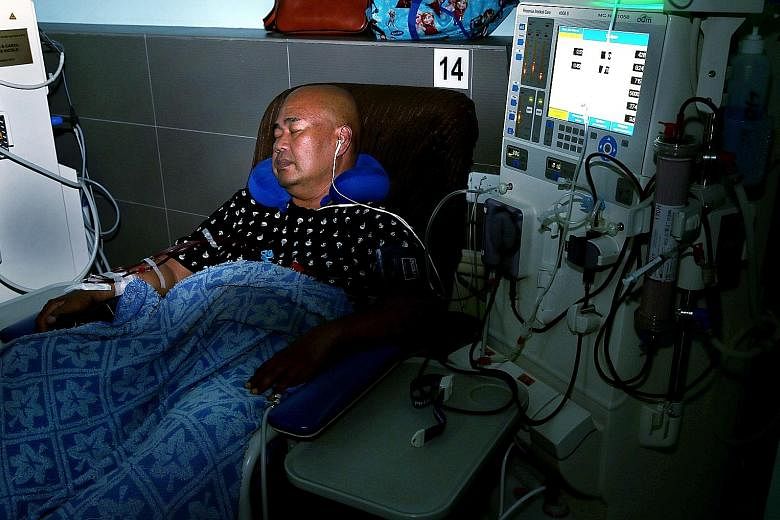They turn up dressed in loose and comfortable clothing, and drape blankets over themselves as they lean back in easy chairs.
Not long after the lights are dimmed at 11pm, light snoring can be heard wafting from various corners of the room.
A midnight movie screening?
No, this is the scene playing out at kidney dialysis centres in Jurong West and Hougang every night. The two centres operate every day round the clock.
A group of 20 patients have been receiving nocturnal dialysis treatment at the two centres thrice a week, but on different days.
Singapore's largest provider of kidney dialysis treatment - the National Kidney Foundation (NKF) - became the first and only operator here to offer patients the option of night dialysis last year. NKF runs 31 dialysis centres islandwide.
The arrangement has benefited both patients and the NKF.
The NKF has not been able to keep up with the rising number of kidney patients. Every day, there are five new cases of kidney failure, and those who need dialysis topped 6,200 in 2015. NKF currently serves two in three of these patients and it plans to open five more centres by next year.
Since May, the charity has been forced to subsidise new patients to receive dialysis at private centres because all their facilities are full.
Nocturnal dialysis has helped lighten the load at the NKF centres.
More importantly, NKF said research shows that night dialysis results in better health outcomes for some patients, compared with those who go for it during the day.
Nocturnal dialysis lasts about seven hours compared with the four-hour sessions done during regular hours, which is 7am to 11pm. The longer hours mean that toxic waste and fluids are removed at a slower rate and this puts less stress on the heart.
Day sessions tend to be shorter because NKF has to accommodate three different batches of patients who come in during three time slots during the day.
"Nocturnal dialysis with longer dialysis hours also allows for the removal of some of the bigger-sized toxins that are not removed efficiently by the usual dialysis," said Dr Mooppil Nandakumar, NKF's medical director.
Countries such as Canada and the United States have been doing nocturnal dialysis for several years.
A 2010 research paper on patients who received night dialysis in North America, for instance, found that they were hospitalised less, gained more weight and had lower blood pressure compared with their peers who received dialysis during shorter daytime sessions.
Besides better health outcomes and survival rates, night dialysis enables patients to work and spend more time with their families during the day.
Taxi driver Chew Boon Seong, 52, has been able to drive for longer hours because he no longer needs to make time for dialysis sessions during the day.
"I feel more energetic now. So I can drive from 7.30am to 8pm every day. My income has doubled and I have better appetite now," said Mr Chew, who goes to the Jurong West centre for night dialysis thrice a week.
Patients on nocturnal dialysis are allowed a less restrictive diet and generally need less medication.
The two centres have room for a total of 70 patients during the night shift. NKF said that the take-up rate for night dialysis has been middling because many people still prefer to sleep in their own beds.
"More than half of our patients are aged 60 and above and they are afraid to change their existing lifestyles of sleeping in their own homes," said Dr Nandakumar.
"But patients who do night dialysis have told us that they feel much better and are able to work longer hours now. We hope to help patients to achieve better clinical outcomes for a better quality of life."
•NKF will be organising a charity carnival on Aug 5 and 6 at Marina Barrage. All funds raised will go towards providing haemodialysis patients with artificial kidneys needed to sustain their lives. For more information, go to https://www.nkfs.org/event/charity-carnival-2017/


